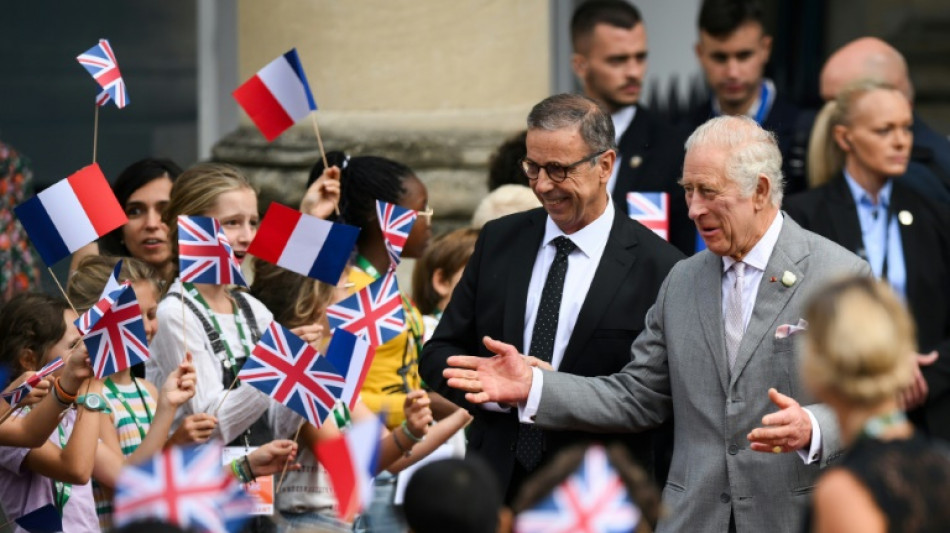
Charles wraps up France trip with enthusiatic crowds in Bordeaux

King Charles III on Friday was greeted by enthusiastic crowds and even had the honour of a hymn sung for him by the Fijian rugby team as he wrapped up a state visit to France with a stop in the southwestern city of Bordeaux.
The 74-year-old British head of state's three days of diplomacy have sought closer cross-Channel links after Brexit but also closer cooperation on environmental issues, his lifelong passion, that are now top of the global political agenda.
The tour, rescheduled from March after unrest in France over pension reforms forced a last-minute postponement, included a glittering state dinner at the Palace of Versailles as well as a landmark address at the Senate, and been largely well received.
Crowds of Union Jack-waving well-wishers gathered outside Bordeaux city hall to welcome Charles and Queen Camilla as they arrived after landing at the city's airport, with the royal couple happily mingling and shaking hands, AFP correspondents said.
The welcome was even more cheerful than that the king and queen received during their stay in Paris, with the royal couple at times lost from view amid a sea of outstretched arms recording the scene for posterity with phones.
"We like this kind of event, just going there and taking photos, because these are social moments, which bring people together," said Marie, a 20-year-old student. "The political culture in France is completely different, but that's what's interesting to see too."
Walking through the centre of Bordeaux, Charles and Camilla were also given a rousing welcome by the Fiji rugby team, in town for the World Cup, with the Pacific islanders treating the couple to a full-throated rendition of a hymn.
- 'Iron Duke' -
Bordeaux is well placed to illustrate the point hammered home throughout the visit about Britain and France's shared personal, political and cultural history.
It became a British possession in 1152, when the future English king Henry II married Eleanor of Aquitaine, effectively beginning three decades of English dominance in the region, until the end of the Hundred Years' War in 1453.
The British influence remains: some 39,000 British expats live in Bordeaux -- the highest number in France.
Later in the day, Charles celebrated defence ties between the two NATO allies aboard the British frigate HMS Iron Duke.
Ironically, the vessel is named after the Duke of Wellington, the British commander who defeated Napoleon at the battle of Waterloo in 1815.
In a key engagement on a visit where the environment has always been centre stage, Charles will then go on to visit a research centre looking at how forests are adapting to climate change.
Huge fires, fuelled by drought and high temperatures, ripped through the southwestern Gironde region last year.
His last stop before heading home is a visit to the Chateau Smith Haut Lafitte vineyard, which has become a model of sustainable practices.
The vineyard, founded in the 14th century and named after its Scottish former owner George Smith, uses organic compost and carbon dioxide recycling technology, shunning pesticides and herbicides.
On Thursday, Charles called for a new Franco-British partnership for the environment -- an alliance for sustainability -- as part of a wider effort to repair frayed political ties caused by Brexit.
Speaking to lawmakers in the upper chamber of parliament -- a first for a British monarch -- he notably called climate change "our most existential challenge of all".
Some commentators in the UK interpreted that as coded criticism of Prime Minister Rishi Sunak, who this week rowed back on the government's net zero commitments.
But Charles has long warned about the need to protect the environment for future generations, and he praised efforts by governments in both London and Paris for making moves to address the issue.
C.Bell--TNT